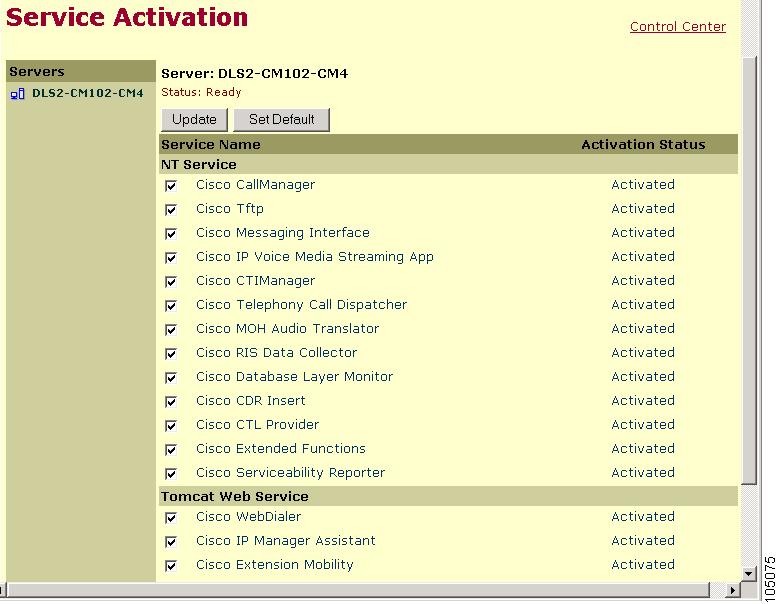

-
Cisco CallManager Serviceability System Guide, Release 4.1(3)
-
Index
-
Preface
-
Introduction
-
Performance Objects and Counters
-
Cisco CallManager Services
-
Tools Overview
-
Service Activation
-
Control Center
-
Alarms
-
Trace
-
Real-Time Monitoring Tool
-
Quality Report Tool
-
Serviceability Reports Archive
-
Microsoft Performance
-
Bulk Trace Analysis
-
CDR Analysis and Reporting
-
Remote Serviceability Overview
-
Cisco Secure Telnet
-
Show Command Line Interface
-
Simple Network Management Protocol
-
CiscoWorks2000
-
Path Analysis
-
System Log Management
-
Cisco Discovery Protocol Support
-
Appendix: Cisco CallManager Performance Counters, RTMT, and CISCO-CCM-MIB
-
Appendix: Trace Examples
-
Appendix: Performance Objects and Counters
-
Table Of Contents
Understanding Service Activation
Where to Find More Information
Service Activation
This chapter provides general and procedural information on the Serviceability Service Activation tool.
This chapter contains the following topics:
•
Understanding Service Activation
•
Where to Find More Information
Understanding Service Activation
Cisco CallManager Serviceability provides a web-based Service Activation tool that is used to activate or deactivate multiple services and to select default services to activate.
Activate or deactivate services in the Service Activation web pages by checking the check boxes beside the service names and clicking the Update button.
The Service Activation tool activates services in automatic mode. It also checks for service dependencies based on single-server configuration. When you click the Set Default button, the Service Activation tool chooses those services that are required to run Cisco CallManager based on a single-server configuration. For example, if you choose one service, you will be prompted whether you want to choose all the other services that depend on that service to run Cisco CallManager based on a single-server configuration, if any. If you have a multiserver cluster configuration, refer to "Service Activation" in the Cisco CallManager Serviceability Administration Guide for service considerations.
CautionOnly activate/deactivate services from the Service Activation windows. If you activate/deactivate services from the Windows Service Control Manager instead of from Service Activation, entries do not get added/removed from the database table; therefore services will not get properly configured and will be out of sync with the Cisco CallManager database.
Note
If you deactivate the Cisco CallManager and CTIManager services in Service Activation, the Cisco CallManager where you deactivated the service no longer exists in the database. Hence, you cannot choose the Cisco CallManager for configuration operations in Cisco CallManager Administration because it will not display in the graphical user interface (GUI).
If you then reactivate the services on the same Cisco CallManager, the database creates the Cisco CallManager again and adds a "CM_" prefix to the server name or IP address; for example, if you reactivate the Cisco CallManager or CTIManager service on a server with an IP address of 172.19.140.180, then CM_172.19.140.180 displays in Cisco CallManager Administration. You can now choose the Cisco CallManager, with the new "CM_" prefix, in Cisco CallManager Administration.
Tip
You can access the Control Center web pages from a link on the Service Activation windows. Use the Control Center tool to start and stop services, one service at a time. Refer to "Control Center" for more information about Control Center.
Figure 5-1 shows a services activation status example for a particular server.
Figure 5-1 Activation Status of Services Using Service Activation
Service Installation
If you are installing Cisco CallManager for the first time, all services that are required to run Cisco CallManager automatically installs the system; however, none of the services gets activated at the completion of the installation (except for the Cisco Database Layer Monitor service). You must activate the services that you want, including the Cisco CallManager service, from Service Activation in Cisco CallManager Serviceability. Activating a service does not start it. You can start/stop services from the Control Center. See "Control Center" section.
Note
If you are upgrading Cisco CallManager, those services that already started on your system will start after the upgrade.
View Status of Services
Use the Control Center tool to view the activation status of Cisco CallManager services for a particular server in a cluster. Control Center displays activation status for both NT services, as well as the Cisco Tomcat Web service Cisco IP Manager Assistant (IPMA).
Deleting Services
When you activate services for a server, the system makes database entries for each activated service. When a server gets permanently removed from a Cisco CallManager cluster, the database entries for the services that are already activated in that particular server still exist and continue to show up in the list of servers in the Cisco CallManager Serviceability and administration windows. You must use the Delete Services utility to permanently remove the database entries. You can find the link for the Delete Services utility displays in the Service Activation web pages, but it will only display if you choose a server that has been permanently removed from the Cisco CallManager cluster. Refer to "Service Activation" in the Cisco CallManager Serviceability Administration Guide for more information about how to use this utility.
Where to Find More Information
Related Topics
•
"Service Activation", Cisco CallManager Serviceability Administration Guide
Additional Cisco Documentation
•
Troubleshooting Guide for Cisco CallManager

 Feedback
Feedback


